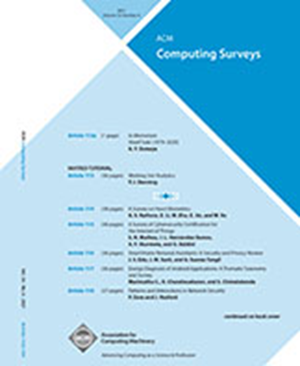Causal Discovery from Temporal Data: An Overview and New Perspectives
IF 23.8
1区 计算机科学
Q1 COMPUTER SCIENCE, THEORY & METHODS
引用次数: 0
Abstract
Temporal data, representing chronological observations of complex systems, has always been a typical data structure that can be widely generated by many domains, such as industry, finance, healthcare and climatology. Analyzing the underlying structures,从时态数据中发现因果关系:概述与新视角
代表复杂系统按时间顺序观测结果的时态数据一直是一种典型的数据结构,可广泛应用于工业、金融、医疗保健和气候学等多个领域。分析底层结构,即因果关系,对各种应用都极具价值。最近,从时态数据中发现因果关系被认为是一项有趣而又关键的任务,吸引了大量研究人员的关注。根据时态数据的性质和结构,现有的因果发现工作可分为两个高度相关的类别,即多变量时间序列因果发现和事件序列因果发现。然而,以往的研究大多只关注多变量时间序列因果发现,而忽略了第二类因果发现。在本文中,我们明确了这两类发现之间的相似性,并概述了现有的解决方案。此外,我们还为时态数据因果发现提供了公共数据集、评估指标和新视角。
本文章由计算机程序翻译,如有差异,请以英文原文为准。
求助全文
约1分钟内获得全文
求助全文
来源期刊

ACM Computing Surveys
工程技术-计算机:理论方法
CiteScore
33.20
自引率
0.60%
发文量
372
审稿时长
12 months
期刊介绍:
ACM Computing Surveys is an academic journal that focuses on publishing surveys and tutorials on various areas of computing research and practice. The journal aims to provide comprehensive and easily understandable articles that guide readers through the literature and help them understand topics outside their specialties. In terms of impact, CSUR has a high reputation with a 2022 Impact Factor of 16.6. It is ranked 3rd out of 111 journals in the field of Computer Science Theory & Methods.
ACM Computing Surveys is indexed and abstracted in various services, including AI2 Semantic Scholar, Baidu, Clarivate/ISI: JCR, CNKI, DeepDyve, DTU, EBSCO: EDS/HOST, and IET Inspec, among others.
 求助内容:
求助内容: 应助结果提醒方式:
应助结果提醒方式:


